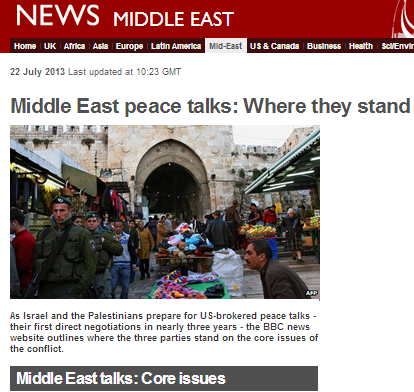With the end of the nine-month framework set for the current round of talks between Israel and the PLO rapidly approaching and apparently little headway having been made, it is obviously crucial that BBC audiences should be accurately informed with regard to the factors curtailing progress if they are to be able to “participate in the global debate on significant international issues” as pledged in the BBC’s public purpose remit. 
In July 2013, as the talks were about to commence, the BBC News website produced a backgrounder intended to inform audiences about what it considered to be the five “Core Issues” of the negotiations: Jerusalem, borders, settlements, refugees and security.
Since its publication that backgrounder has not been updated to reflect developments over the past eight months. For example, in the section titled refugees the Palestinian position is presented thus:
“Formally, they maintain the “right of return”, arguing that without it a great injustice would not be put right. However, there has been regular talk among Palestinians that this “right” could be met by compensation. They refuse to recognise the concept of Israel as a “Jewish state”, saying that this is unnecessary and that it ignores the Israeli-Arab citizens of Israel.”
In other words, the BBC presents the Palestinian demand for the ‘right of return’ for refugees as a mere formality and herds audiences into believing that the issue will actually be resolved on a practical level by means of compensation.
Let’s take a look at what the PA president Mahmoud Abbas himself has had to say on the subject recently.
On March 6th Abbas spoke before young activists from his own Fatah party, making it clear that his position (and presumably that of the PLO which he also heads) is not either ‘right of return’ or compensation as promoted by the BBC, but both.
“The Right of Return is a personal right. If you are a refugee, your son is a refugee as well. Perhaps you will decide to relinquish this right while your son decides not to, or vice versa. Your son is free to do so. When we say that this is a personal choice, it means that he can decide for himself. We will all be making a choice: One option is to remain where we are – in Jordan, in Syria, in Lebanon, and so on – and receive compensation…Of course…
“The second option is to go to another country, as part of an agreement. If someone wants to emigrate to Canada, he is free to do so. Wherever one goes, one remains a Palestinian. In this case, he will receive compensation as well.
“The third option is to decide to return to the Palestinian state, and to receive compensation.
“He can also decide to return to the State of Israel. In such a case, he will receive compensation and return.
“These are the options that we place before the Palestinians. They will choose. If you want to stay where you are – fine. If you want to go abroad – fine. If you want to come to Palestine – fine. If you choose to return [to Israel] and hold Israeli citizenship… This is what it means. Someone asked me how he could become an Israeli citizen. I asked him if he wanted to continue to be stateless after he is back. He will be returning to the State of Israel.
“All the refugees who number 5 million today, along with their offspring, are considered 1948 refugees. There are no refugees who came from Nablus or Ramallah. They are all from Tiberius, Safed, Acre, Nazareth, Jaffa, Beersheba, and so on.” […] [emphasis added]
On March 9th Abbas received backing from the Arab League for his refusal to recognize Israel as the Jewish state, with the implication of that being that there will also be no compromise on the issue of the ‘right of return’ not just on the part of the Palestinians, but also in the wider Arab world.
On March 17th Abbas visited Washington where he reportedly again rejected the idea of compromise on the ‘right of return’ issue.
“…Abbas rejected Prime Minister Benjamin Netanyahu’s demand that he recognize Israel as a Jewish state. He also refused to abandon the Palestinian demand for a “right of return” for millions of Palestinians and their descendants — a demand that, if implemented, would drastically alter Israel’s demographic balance and which no conceivable Israeli government would accept. And finally, he refused to commit to an “end of conflict,” under which a peace deal would represent the termination of any further Palestinian demands of Israel.”
In the past few weeks BBC audiences have been repeatedly told that “there has been little sign of progress” in the current negotiations. They are not, however, being informed as to why that is the case.
Related Articles:
Accuracy and impartiality issues in BBC report on Abbas White House visit
Why has the BBC stopped reporting on the Israel-PLO peace talks?
BACKGROUNDER: The Palestinian Claim to a “Right of Return” (CAMERA)




